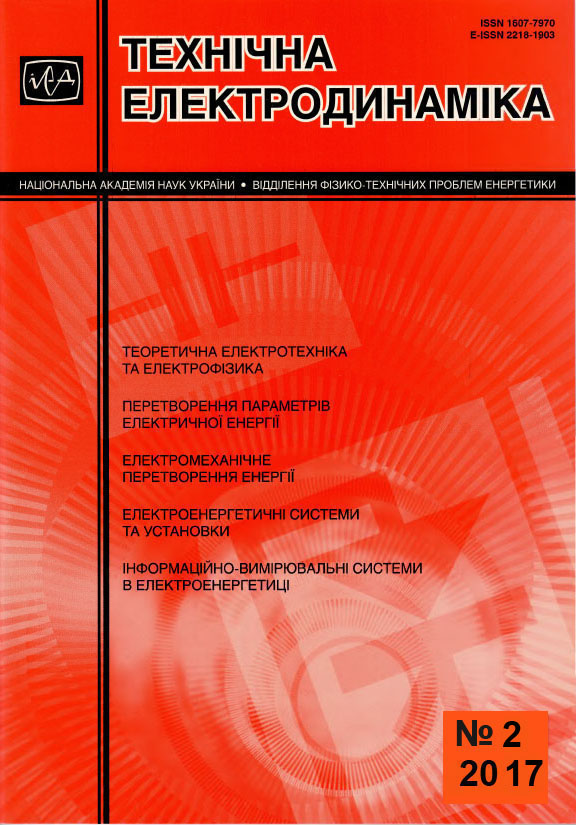Abstract
The physical meaning of the proposed formula of apparent power is defined for the resistive model of a transmission line of three-phase four-wire power supply system in a non-sinusoidal unbalanced periodic mode. This is the geometric mean of the power losses from the line currents and phase voltages of the load under conventionally removed supply sources. Comparative analysis of the proposed formula is conducted with the expressions for total power, based on IEEE and European standards, and the conditions of their equivalence is defined. Energy-efficient control algorithms by means of parallel active filtering is considered, corresponding to the decompositions of total power, regulated by the IEEE standard. Calculated ratio to minimize power losses is defined under the application of these tools. References 12, figures 4.
References
Artemenko M.Yu. Apparent power of three-phase power system in nonsinusoidal mode and energy effectiveness of shunt active filters // Elektronika i zviazok. – 2014. – No 6. – Рp. 38–47. (Ukr)
Artemenko M.Yu., Batrak L.M., Mykhalskyi V.M. and Polishchuk S.Y. "Energy performance optimization of the three- phase four-wire power supply system with a parallel active filter in the unbalanced sinusoidal mode // Tekhnichna Elektrodynamika. – 2015 – No 2. – Pp. 30-37. (Ukr)
Artemenko M.Yu., Batrak L.M. Сontrol strategy of shunt active filter for three-phase four-wire power system with multivariate proportional-vector formation of instantaneous source currents // Elektronika i zviazok. − 2014.– No 2. – Pp. 36 – 44. (Ukr)
Polishchuk S.Y., Artemenko M.Yu., Mykhalskyi V.M., Batrak L.M., Shapoval I.A. Shunt active filter control strategy with partial decrease of zero-sequence voltage in three-phase four-wire system // Tekhnichna Elektrodynamika. – 2013. – No 3. – Pp. 12–19. (Ukr)
Sirotin Yu.A. Vectorial instantaneous power and energy modes in three-phase circuits // Tekhnichna Elektrodynamika. – 2013. – No 6. – Pp. 57–65. (Rus)
Akagi H., Watanable E.H., Aredes M. Instantaneous power theory and applications to power conditioning. – Piscataway, NJ: IEEE Press, 2003. – 379 p.
Czarnecki L.S. Currents’ Physical Components (CPC) concept: a fundamental of Power Theory // Przegląd Elektrotechniczny. – 2008. – Vol. 84. – No 6. – Pp. 28–37.
Emanuel A.E. Power definitions and the physical mechanism of power flow. – John Wiley & Sons. IEEE Press, 2010. – 274 p.
Patricio Salmerón Revuelta, Salvador Pérez Litrán, Jaime Prieto Thomas Active Power Line Conditioners Design, Simulation and Implementation for Improving Power Quality.– Elsevier Inc., Academic Press, 2016. – 436 p.
Salmerón P., Vázquez J.R., Herrera R.S. and Litrán S.P. Apparent power and power factor in unbalanced and distorted systems. Applications in three phase load compensations // International Conference on Renewable Energies and Power Quality (ICREPQ’07). – Sevilla, Spain, 28–30 Mach, 2007. RE&PQJ. – 2007. – Vol. 1. – No 5. – Pp. 442–447. (URL: http://www.icrepq.com/icrepq07/312_Salmeron.pdf ).
German Standard AC Quantities: Part 2- Multi Conductor Circuits.DIN std. 40110, 2002.
IEEE Standard Definitions for the Measurement of Electric Power Quantities under Sinusoidal Non sinusoidal, Balanced or Unbalanced Conditions. IEEE Standard 1459-2010, Sept. 2010.

This work is licensed under a Creative Commons Attribution-NonCommercial-NoDerivatives 4.0 International License.
Copyright (c) 2022 Tekhnichna Elektrodynamika


